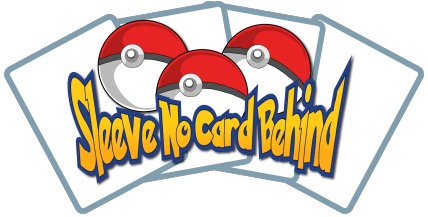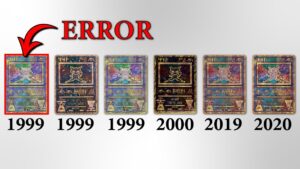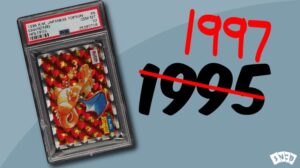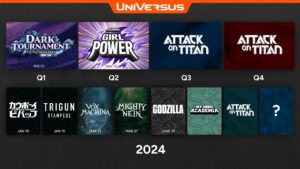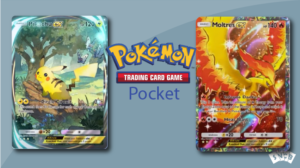How To Get Trading Cards Graded In Canada
-
By: Oliver Copeland
- Published:
- Last Updated: January 8, 2024
There are plenty of perks to living in Canada as opposed to the US, but PSA grading isn’t one of them. The majority of the trading card community won’t hesitate to recommend PSA as the grading company of choice, with little thought about those of us in other countries.
This guide will walk you through step-by-step how to select a grading company and have your cards graded, all in the context of being in Canada.
Table of Contents
Step 1: Select A Grading Service
Domestic
I’ve put together a list of only Canadian grading companies. But first, consider why Canadian grading is right for you. Choosing to have your cards graded domestically has many benefits, such as:
- No currency conversion (cheaper!)
- Faster Shipping
- Cheaper Shipping
- No customs charges or hang-ups
- Supporting local businesses
- A shorter and safer journey for your cards
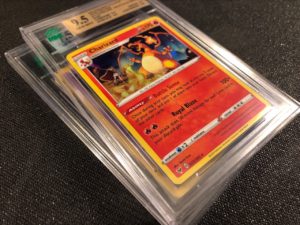
MNT Grading
MNT Grading is a great service to use and with a few years under its belt, submissions go smoothly and without hassle. Their website is clean and organized, very well reflecting their approach to the service. Their prices are a little higher than others, but they often have deals such as Black Friday and Back to School sales.
This is actually my personal choice for domestic grading, and after a few submissions of my own, I’m a fan. Actually, I’ve written about my experience with them in detail.
Their slabs are very similar to Beckett’s slabs, not only in dimension but overall aesthetic, too. MNT does display subgrades on every label free of charge, and offers the highly sought-after ‘Flawless 10′, much like Beckett’s black label.
Price range: $$$$
What kind of cards do they grade?
- Sports
- Pokémon
- Yu-Gi-Oh!
- Magic: The Gathering
- Pretty much everything else
How long have they been in business?
Established in 2016, so about 7 years.
KSA Grading
KSA is probably Canada’s most well-established grading service. They are based out of Ontario and have been operating for over two decades. When submitting with KSA you can expect fast and professional service.
KSA built its reputation off of sports card grading but also grades other trading cards as well as coins. KSA also sells NFTs, phygitals, and has its own card market online where you can purchase graded cards straight from them.
This outreach into the market is why KSA has such a solid and widespread reputation.
Their popularity among collectors has recently been threatened by other domestic grading companies. Services such as MNT offer subgrades, KOBA offers bounties on specific cards, and pretty much everyone else has a much more aesthetically appealing slab.
Price range: $$$
What kind of cards do they grade?
- Sports
- Pokémon
- Yu-Gi-Oh!
- Magic: The Gathering
- Pretty much everything else
How long have they been in business?
KSA has been in business since 1996, so about 27 years.
Great Canadian Grading (GCG)
Great Canadian Grading is a brand-new grading service that recently opened its doors in Vancouver, BC. As a result of their recent establishment, their prices are dirt cheap.
In addition to sports cards, they also grade comic books and offer a few extra services as well, such as grader’s notes. There isn’t a lot to say about a brand-new grading company like this but they are absolutely worth a try.
Price range: $
What kind of cards do they grade?
- Sports
How long have they been in business?
Established in 2022, so about 1 year.
Hall of Fame Grading (HOF)
Hall of Fame Grading is another new-to-the-market grading service. While they do specialize in sports, they will grade pretty much any card you have.
They also offer custom labels. These are labels that have been specifically designed to compliment the aesthetic of the card by taking the colour scheme or objects and implementing them into the graphic design; a really cool feature that not many services offer.
Price range: $
What kind of cards do they grade?
- Sports
- Pokémon
- Yu-Gi-Oh!
- Magic: The Gathering
- Pretty much everything else
How long have they been in business?
Established in 2020, so about 3 years.
KOBA Grading
Based out of Edmonton, Alberta, KOBA is new to the scene but making a splash. Unlike the other services in this article, KOBA does not grade sports cards. This is a bold move but directly works toward establishing themselves as expert TCG graders.
Another unique service they provide is grading altered arts. This is when a card is submitted that someone has chosen to write/paint/draw on the card to customize the artwork. When these are graded by KOBA, the card will receive an “NG” designation.
KOBA grading implements a label colour tier system too, just like MNT grading and others. However, encapsulated beside the label is a lion emblem (their logo) that has the same colour as the label. A black label 10 in KOBA terms is referred to as an “onyx lion”.
But KOBA has done even more to stand out from the competition. They offer “bounty cards”, a new and exciting incentive for collectors to send cards in. You can check their bounty page to see which cards have a bounty on them. “The first collectors to grade these cards and get an onyx lion will receive a KOBA Grading trophy card.” Very cool idea!
Price range: $$
What kind of cards do they grade?
- Pokémon
- Yu-Gi-Oh!
- Magic: The Gathering
- Other TCGs
How long have they been in business?
Established in 2022, so about 1 year.
Overtime Grading
Overtime grading is fresh on the Canadian market and has fostered a small, but the surprisingly wholesome community on Facebook who loves to interact with Rob, the founder. The best part is that Rob actively interacts back with his community, which is a priceless asset in small business.
The slabs emulate PSA’s look in great detail. The label is a red/white design and the cases are frosted. If you scroll through the Facebook group, you will see that Overtime Grading is sports focused, but have graded the odd trading card here and there.
Price range: $$
What kind of cards do they grade?
- Sports
- Some other trading cards
How long have they been in business?
Established in 2021, so about 2 years.
ACA Grading
ACA Grading is Quebec’s own grading service. The current owners acquired the business in 2017 and have done well. ACA is one of the few grading services to actually have a history rooted in Canadian culture and they lean into this by marketing directly to French Canadians.
In addition to ACA, the owner also co-owns Anti-Expo, the largest sports collectors fair in Quebec.
Price range: $$$
What kind of cards do they grade?
- Sports
How long have they been in business?
I couldn’t find an answer to this. I reached out to ACA Grading and am waiting to hear back.
International
If you’ve chosen to send your cards out-of-country then you may as well send them to one of the four biggest grading companies in the world, which are all US based. This option will be a little more expensive and might take longer, but grading with these services will grant you the highest return on investment.
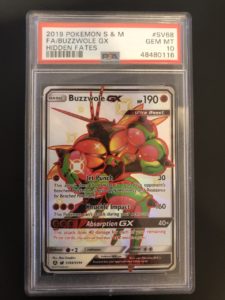
Professional Sports Authenticator (PSA)
PSA is considered one of the most respected and trusted names in the industry and has been in business for over 30 years. They grade everything and are the leading third-party grading company in the world.
PSA offers a huge range of grading and authentication services. They’ll grade all kinds of pieces from your collection, like sealed booster packs, Funko Pops, concert/game tickets, and more.
PSA is among the most expensive services but also brings the highest increase in value. Collectors want PSA-graded cards, and they pay a premium for them.
However, grading expensive cards with PSA is going to come with a price, literally. PSA has a ramping pricing system based on the value of your card. For example, if you want a card graded and its estimated cost is $10,000-24,999 they’ll charge you $1,000 to grade it. That’s in USD currency, by the way. You can check their pricing here.
Price Range: $$$$$
What kind of cards do they grade?
- Sports
- Pokémon
- Yu-Gi-Oh!
- Magic: The Gathering
- Pretty much everything else
How long have they been in business?
Established in 1991, so about 32 years.
Beckett Grading Services (BGS)
Beckett is among the most trusted in the world, and many argue that BGS is more well-respected than PSA. Whatever the case, BGS is a very good option if you want to get your cards graded. They are based out of Dallas, Texas, so that’s a pretty long way from anywhere in Canada.
BEGS offers subgrades, which is always cool to have. They also offer a legendary black label. This is when the card scores a 10 in all subgrades and is considered absolute mint. A BGS black label is the highest caliber of grade a card can receive, period. In all cases, a black-label BGS will sell for significantly more than a PSA 10 or any other grading services equivalent.
Price Range: $$$$
What kind of cards do they grade?
- Sports
- Pokémon
- Yu-Gi-Oh!
- Magic: The Gathering
- Pretty much everything else
How long have they been in business?
Established in 1984, so about 39 years old.
Certified Guaranty Company (CGC)
CGC is part of a much larger collectible industry than most of the services here. Originally, CGC did not grade trading cards but focused on all other collectibles. They will grade comic books, video games, sports memorabilia, and more.
Because of CGC’s huge presence in the industry, they are beyond well-respected when it comes to their trading card grading.
One thing CGC offers that others don’t is their error card qualifiers. They will grade any trading card that has been miscut, misprinted or any other variation of an error. This is a really cool and smart move, as CGC dominates this niche market.
The company really established itself in this way, as they have now graded many extremely rare and valuable Pokémon cards such as the test-print Blastoise, and other very unique collector cards that probably belong in a museum.
Price Range: $$$
What kind of cards do they grade?
- Sports
- Pokémon
- Yu-Gi-Oh!
- Magic: The Gathering
- Pretty much everything else
How long have they been in business?
Established in 1999, with their trading card division opening up in 2020. So, 24 or 3 years, depending on how you look at it.
Sportscard Guaranty LLC (SGC)
SGC is another well-respected grading service in the industry. They are known more for sports cards than trading cards but grade it all.
The way SGC stands out from the crowd is its unique slab. They include a black insert into the case, nicknamed the “Tuxedo”. It’s a different look than most grading services and some think it helps present the card in a nicer way. The Canadian equivalent here would be KSA.
Price Range: $$$$
What kind of cards do they grade?
- Sports
- Pokémon
- Yu-Gi-Oh!
- Magic: The Gathering
- Pretty much everything else
How long have they been in business?
Established in 1998, so about 25 years.
Step 2: Prepping and submitting your order
Pre-grading your cards
Before you send your cards off, you’ll first want to have a close look to recognize any imperfections that could compromise the grade.
Most, if not all grading services use a 4-point system called sub-grades to determine the overall grade.
- Corners
- Surface
- Edges
- Centering
Corners
Corners are often the first to receive damage when a card is transferred in and out of sleeves, binder pages, and other storage devices. Grading services will be checking for any kind of wear including, fraying, notching, fuzzy corners, rounding, layering, and dings.
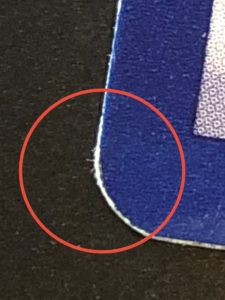
Surface
The primary culprit here is going to be scratches. Cards that have been played with will receive scratched very quickly if not sleeved. Even repeated insertion into a sleeve can cause slight scratches to the foil portion of a card.
Grading services will check both the front and back surfaces of the card for any scratches, print spots, creases, colour imperfections, stains, ink marks, scuffing, tears, discoluoration, and more.
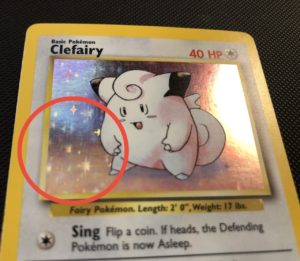
Edges
Edges include all edges but the corners of the card. The edge of a card isn’t protected in the same way as the surface and is exposed to all kinds of damage.
When you send your cards in, they’ll be looking for chipping, notching, delamination, and roughness.
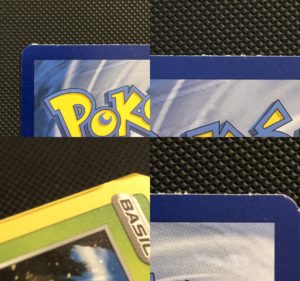
Centering
Centering is the accuracy of which the printed image of the card is centered on the cut piece of cardstock. Most trading cards have borders, which makes pre-grading centering easy.
Both the front and back will be inspected, but the back often gets a little more grace. For example, a gem mint grade often required 50/50 centering on the front, but can have 60/40 on the back. A quick tip for judging centering with the naked eye is to look at the corners where the border meets; it is easy to see the difference in thickness this way.
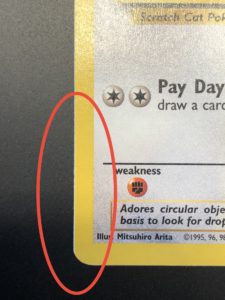
If you want to take a guess at what grade your card may receive, check these grading standard guidelines:
Filling out the submission form
All grading services are going to require a submission form to be filled out when you send your cards in.
This is a document where you record the complete list of cards that you’ll be sending in, and include details such as the card’s copyright date, expansion set name, and declared value.
You’ll have to know all the details about the cards you are sending in. If you make a mistake here and misspell a card name or enter the incorrect date, they will often catch this and print the correct data on the label before sending it back to you.
Most services are going to require you to physically print this form out, so make sure you have access to a printer. Then the form will be included in the package of cards that you send in.
Packaging your cards for shipment
Most of these grading services are going to be very picky about how to package your cards to be submitted.
There are several guidelines that grading services typically recommend when it comes to packaging cards for shipping. These guidelines may include using a protective case like semi-rigid sleeves and standard sleeves for the card, using a sturdy cardboard backing or top loader, and using bubble wrap or other cushioning material to provide extra protection. It is also a good idea to use a sturdy box and plenty of packing material to prevent the item from moving around during transit.
Grading services may also have specific requirements for how items should be packaged and shipped. For example, they may require that items be shipped with a tracking number or signature confirmation to ensure that they can be traced and delivered safely. It is always a good idea to check the specific guidelines of the grading service you are using to make sure you are following their requirements.
Here are some shipping guidelines from a few grading companies:
Domestic
International
Using a middleman service (optional)
Shipping your cards out can be intimidating, even if you’ve done it before. The farther away your ship your cards and the more strict the packaging is, the more can go wrong.
A middleman service is a company that will do everything for you. All you have to do is send them your cards, and they will handle everything else. Of course, this comes at a cost, but it is usually very affordable because grading services will offer bulk discounts. If you only have a few cards to send in, a middleman service can send your cards in with a bulk submission and save everyone a few bucks while also making a profit for themselves.
I wouldn’t recommend using a middleman service if you are grading domestically. If you want to send your cards to the US, then a middleman service may be a good idea, as they are used to dealing with international shipping and customs.
Here are some middleman services in Canada that will ship to the US grading services:
Official Dealers
Another option is to look for official dealers for your chosen grading service. For example, the MNT Grading dealer locator page has a list of stores in each province that will submit your cards for you. This is like using a middleman service but with added security.
Step 3: Receiving your cards
Finally, your cards have arrived back on your doorstep. Most of the time, you can check the grades your cards received through the service’s website, but if you’re like me, you wait until the actual package arrives.
Check Your Grades
Obviously, the first thing you’re going to do is check the grades your cards got. Remember that the professionals grading your cards have tools and experience on their side. They don’t just grade the cards with the naked eye, but use various techniques and state-of-the-art tech to analyze them. They can see things you can’t.
That being said, if you strongly disagree with a grade, you can sometimes resubmit the card for review. Most services will charge for this, though.
Another option is to crack the slab open and resubmit the card. Of course, this is risky and I do not recommend it. On top of the risk of damage, you could potentially receive the same grade or even a lesser grade when the card returns.
Check prices
Another thing you’ll want to do is check the current market for the prices on your card grades. You can visit PSAs website to do this, or if you chose a different service, just check eBay.
Checking Your Cards Price On eBay
Step 1: Search your card
This is easy. In the search bar on the eBay website, just search your card’s name along with its expansion set number, followed by the grade. For example, Alakazam 1/102 PSA 10.
Step 2: Find sold listings
Remember, sellers on eBay can list their cards at whatever price they want. That means you’ll have to check recently sold listings to see what people are actually paying for your card.
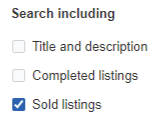
Find the search filters and select “sold listings” and “completed listings”. Now you can scroll through the search results to see what the market is paying for your newly graded card.
Moving Forward
Hopefully, this guide gave you some value and helped you submit your cards for grading!
The card market changes all the time so, from an investment perspective, you might want to keep an eye on the cards you want to grade, or the cards you’ve already graded. This can help you maximize your profit if you’re planning to sell.
If you don’t plan to sell, then enjoy your newly graded cards! Grading from Canada can be a pain in the butt if you’ve never entered this space of the hobby before. Hopefully, you are able to easily choose a service and have your cards submitted easily!
If this guide has helped you at all, please consider sharing it with a friend or posting it to your social media account. This helps me grow the website and help other Canadians with the grading process.

Hi, I'm Oliver. I've been collecting Pokémon cards for 25+ years. I hope you enjoyed your read and learned something. Learn more about me on the About page.
